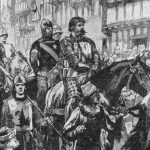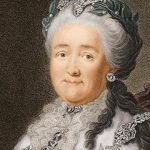Perhaps one of the greatest female rulers of all time, Catherine the Great, was one the most cunning, ruthless and efficient leaders in all of Russia. Her reign, while not too long, was exceptionally eventful and she made a name for herself in history as she climbed up the ranks of Russian nobility and eventually made her way to the top, becoming the Empress of Russia.
Her life began as the daughter to a minor German nobility; she was born in Stettin, in 1729 to a prince by the name of Christian Augustus. They named their daughter Sophia Augusta and she was raised as a princess, taught all of the formalities and rules that royalty learns. Sophia’s family wasn’t particularly rich and the title of royalty gave them some small ability to gain claim to the throne, but nothing was awaiting them if they didn’t take action.
Recommended Reading
Who was Grigori Rasputin? The Story of the Mad Monk Who Dodged Death
FREEDOM! The Real Life and Death of Sir William Wallace
Diverse Threads in the History of the United States: The Life of Booker T. Washington
Sophia’s mother, Johanna, was an ambitious woman, a gossip and most importantly, an opportunist. She greatly craved power and the spotlight, knowing that it would be possible for her little girl to someday take hold of the throne. Sophia’s feelings on the matter were mutual as well, for her mother imparted a hope that she could someday become the Empress of Russia.
Sophia was invited to spend time with Empress Elizabeth of Russia for some time, where Sophia quickly found a deep desire to become the ruler of Russia by any means necessary. She dedicated herself to learning Russian, focusing on achieving fluency as quickly as possible. She even converted to Russian Orthodoxy, leaving her traditional roots as a Lutheran behind, so that she could identify with the culture of Russia on an authentic basis. This would put a strain on her relationship with her father, who was a devout Lutheran, but she didn’t particularly care. Her eyes were wide with the deep desire to be the true leader of Russia. Upon her conversion to Russian Orthodoxy, she took the new name of Catherine.
At 16 she married a young man by the name of Peter the III, he was a drunkard and a pale man whom she certainly didn’t care for in the least. They had met before when they were younger and she knew that he was weak and not cut out for any kind of leadership capacity, but there was a serious upshot to marrying him: he was a Grand Duke. This meant that he was essentially an heir to the throne and would be Catherine’s ticket to the big leagues. He would hopefully lead her to the success and power that she craved.
Even though she was looking forward to the pleasure of someday being a ruler, her marriage to Peter was a miserable affair. They did not particularly care for each other; the relationship was purely one of political benefit. She despised him because he wasn’t a serious man, he was a buffoon and a drunk, who was known to be sleeping around. She spited him greatly and she herself began to take upon some new lovers in the hopes of making him jealous. They didn’t get along well at all.
Despite the frustration, the lies and accusations hurled at one another, they stayed together. After all, the marriage was one of political expediency and not particularly one made out of love. Catherine’s patience paid off in the long run, however as the Empress of Russia, Elizabeth, died in 1762, opening up the throne. Peter was able to make a clean claim to the throne and he succeeded Elizbeth, becoming the new Emperor of Russia. This pleased Catherine because it meant that she was only one heartbeat away from becoming the sole ruler of Russia.
Peter was a weak ruler and he had some odd proclivities. For one, he was an ardent admirer of Prussia and his political views caused alienation and frustration within the local body of nobles. Catherine’s friends and allies were beginning to grow weary of Peter and this was just the opportunity that she needed to seize power to the throne. She put together a plan to stage a coup and force Peter to abdicate the throne, handing power over to herself. She had put up with him long enough and his political weaknesses opened up a great door to his own destruction. Catherine rallied up a big enough force to believe that she would be a worthy owner of the throne, and in 1762, she kicked Peter off of the throne, assembling a small force that arrested him and pressed him into signing control over to her. Catherine had finally achieved her major dream of becoming the Empress of Russia. Interestingly enough, Peter died a few days later in captivity. Some wonder if it was her doing, but there was no evidence to back that up. She certainly did despise the man, however.
Catherine was an exceptionally competent individual. She had spent her whole life preparing for her rule and she wasn’t about to completely waste it by being usurped just like her husband. There had been some level of political pressure to install Catherine’s 7-year-old son, Paul, as the Emperor and she was certainly not about to let that happen. A child could easily be manipulated based on whoever was controlling him, and she was not going to let her reign be threatened by another coup. So, she focused on building up her power as quickly as possible, not sparing a single moment. She increased her strength among her allies, reduced her enemies influence and made sure that the military was on her side.
While Catherine had desired to be a ruler, she certainly had no desire to be a petty or cruel dictator. In her time studying, reading and learning, she had come to understand that there was tremendous value in the concept of the Enlightenment, a political philosophy that at the time embraced knowledge and reason about superstition and faith. Russia at this point in their history, was not particularly well known for being a cultured or educated population. Indeed, the sprawling lands of the Russian world was composed of peasantry who were little more than farmers and a few steps above barbarians. Catherine sought to change the world’s opinion of Russia and set about a plan to become known as a major player on the national stage.
She took on many lovers over her time as the rule of Russia, in fact she was particularly famous for her relationships with these men. Sometimes the relationships were meant to empower her in some capacity, such as her relationship with Grigory Orlov, a man who supported her militarily in her rise to power. Her relationships and liaisons are unfortunately something to speculate, because as is common in history, a great deal of rumors aimed at her sexual promiscuity were unleashed by her rivals. Whether those stories and rumors are true, it is impossible to know, but given the practice at the time to smear that way, it’s possible that most of the tales are simply untrue.
Catherine worked hard to expand Russian territory, working on a military campaign series that would eventually lead her to annexing Crimea. Her original intentions had been to empower and increase the level of freedom of the serfs and ordinary people of Russia, but unfortunately those ideals were thrown by the wayside as it would have caused significant political upheaval amongst the nobility at the time. She had hoped that someday she would be able to help her people in becoming empowered, that every man would be an equal, but unfortunately her desires for the time being were just too far advanced for the culture at the time. Later on, she would end up changing her mind, primarily due to the fact that things like the French Revolution, civil unrest within the country and general fear caused her to realize how dangerous it was to the Aristocracy if everyone were to be made equal. Her policy of freedom was shelved in favor of her longstanding policy of political pragmatism.
Latest Biographies
Queen Zenobia: The Charismatic Empress of Ancient Syria
Eleanor of Aquitaine: A Beautiful and Powerful Queen of France and England
Frida Kahlo Accident: How a Single Day Changed an Entire Life
Catherine was adored by those in the enlightenment era, for she had spent a great deal of time learning how to be cultured, studying many books, acquiring a great many works of art as well as writing plays, stories and musical pieces herself. She worked hard to create the image that she was indeed a woman of taste and refinement, while simultaneously building up her army into something to be feared.
Poland, a country that had been a hot button issue amongst several other nations, was on her list of countries to gain control over. She placed her own lover, a man by the name of Stanislaw Poniatowski, in control of the Polish throne, essentially giving herself a powerful contact who was utterly devoted to her. Soon she was gaining more territory from Poland and was gaining a level of political control over the country as well. Her involvement with Crimea had also sparked a military conflict between the Ottoman Empire and the Russian people, but it was a military conflict that Russia was able to win, proving to the world that Russia was no longer some small whipping boy, but was instead a force to be reckoned with.
Her role in the expansion and legitimacy of Russia on the global theatre is not to be understated. While the international community didn’t particularly look favorably on Russia, they were forced to realize that the country was a powerful one. As Catherine worked to increase the size and strength of the country, she made the executive decision to empower the aristocracy and increased the size of government while simultaneously decreasing the power of the Orthodox Church, as she wasn’t someone who was particularly religious. The decision to make the nobles and ruling class stronger was brought about due to the chaos of the French Revolution, something that had convinced Catherine that there was a great deal to be feared in the common person. For a time, she had ascribed to the ideas of the Enlightenment and granting equality, but fear of loss of control had led her to change her mind for good. She would not go down in history as a woman who cared greatly for the common people, despite how her intentions at the beginning had been noble.
Catherine instead took the working class as a threat, especially after a rebellion was fomented by a pretended by the name of Pugachev. The serfs were the lifeblood of Russia and were often the temperature gauge for how a Tsar of Russia was doing. If the serfdom was extremely unhappy with their ruler, a pretender would usually rise up and claim that he was the true heir to the throne and a violent revolution would be undertaken to install the pretender. Catherine, for all of her enlightened practices and beliefs, was susceptible as ever to this. Pugachev’s Rebellion began when a Cossack by the name of Pugachev decided that he would be better suited for the throne and began to act as if he indeed were the deposed (and also dead) Peter the III. He claimed that he would go easy on the serfs, restore them to greatness and give them a fair share of what they had worked for. Plagues and famine had spread throughout the land of Russia and had threatened the stability of the region, sparking many of these serfs to follow Pugachev’s lead. It is doubtful that they actually believed him to be Peter the III but if it meant change, many of them were willing to say they would believe it.
Pugachev’s forces were strong and numerous, he used them to sack cities and run raids on Imperial caravans, but eventually his forces were beaten back by Catherine’s military. The rebellion had been seen as a small-time affair, but they were effective enough to gain a major bounty on Pugachev’s head, leading to his eventual betrayal by one of his close allies. He was handed over to the authorities and was quickly executed for his crimes in 1775. This rebellion all but cemented Catherine’s suspicion towards empowering the common folk and she hardened her stance towards them once and for all, never working towards liberating the people.
Explore More Biographies
Catherine the Great: Brilliant, Inspirational, Ruthless
Fidel Castro: Life, Work, and Death of an Intriguing Cuban Leader
Brontë Sisters: The First Family of Literature
FREEDOM! The Real Life and Death of Sir William Wallace
The Paradoxical President: Re-imagining Abraham Lincoln
Queen Zenobia: The Charismatic Empress of Ancient Syria
Catherine’s reign was 38 years long and was an exceptionally successful career. She increased the size of Russia significantly, increased the military power and gave the world something to talk about when it came to the legitimacy of the Russian state. She died of a stroke in 1796. Of course, there is that old and tiresome rumor, linked to the concept of her being an exceptionally promiscuous woman, that she died when she tried to have a horse lowered atop her for the purpose of some deviant sex act, only for the ropes to snap and the horse having crushed her to death. This story is false to the highest degree. She died from a stroke, suffering from one in the bathroom and was taken to her bed where she died hours later. She lived an extraordinary life and died a relatively quiet death for a job that often ended in bloody coup’s and terrible rebellions. Of all the rulers of Russia, she was considered to be one the greatest, for she brought in a powerful military, increased the efficiency of the state and created the concept of an artistic, enlightened Russia.
READ MORE:
Elizabeth Regina: The First, The Great, the Only
Sources:
Biography of Catherine the Great: http://www.biographyonline.net/royalty/catherine-the-great.html
Prominent Russians: http://russiapedia.rt.com/prominent-russians/the-romanov-dynasty/catherine-ii-the-great/
Saint Petersburg Royal Family: http://www.saint-petersburg.com/royal-family/catherine-the-great/
Catherine II: http://www.biography.com/people/catherine-ii-9241622#foreign-affairs










Thank you so much! Yes I am definitely looking for a life change and already everything is different! My life looks 100% different to what it did only a few months ago. I will absolutely keep in touch, thank you so much for stopping by and all the eneamrogeucnt!